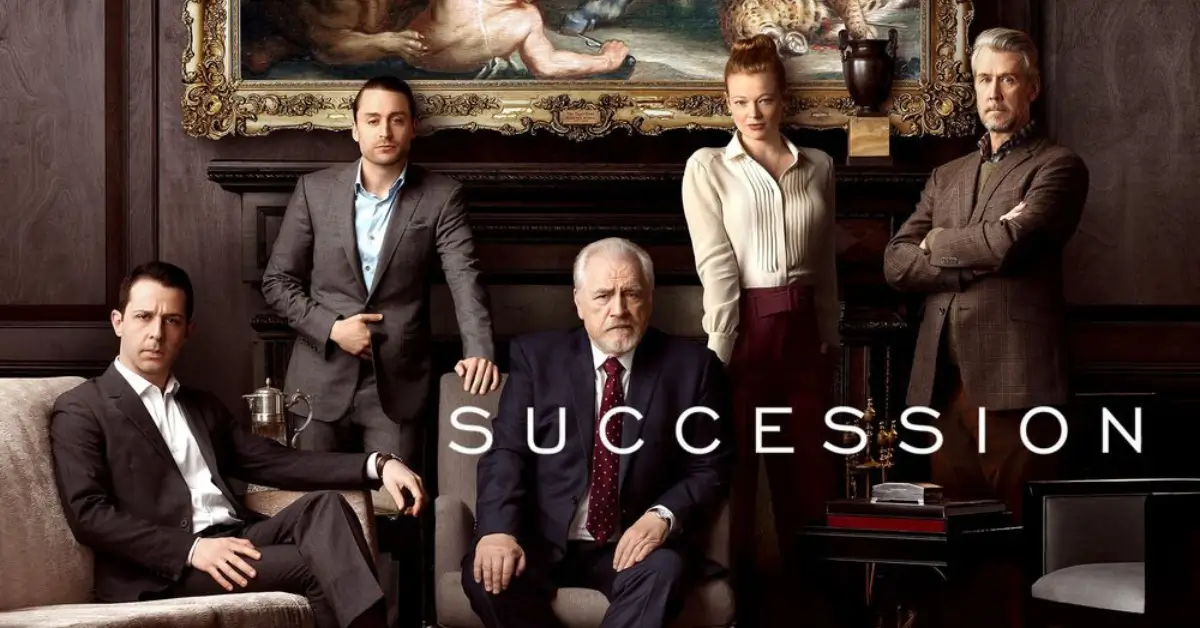Succession: A Masterclass in Wealth, Power, and Mental Health Portrayal
In the golden age of television, HBO’s Succession stands as a towering achievement that masterfully examines the psychological toll of extreme wealth, power dynamics, and familial dysfunction. While the series presents itself as a satirical drama about corporate warfare and family politics, beneath its razor-sharp dialogue and boardroom machinations lies a profound examination of various mental health conditions. As viewers, we’re invited to witness how privilege and power do not shield the Roy family from psychological suffering but rather create unique manifestations of mental health challenges.
Thank you for reading this post, don't forget to subscribe!Basic Film Information
Title: Succession
Release Date & Production Year: June 3, 2018 – May 28, 2023
Creator/Showrunner: Jesse Armstrong
Directors: Various (including Mark Mylod, Andrij Parekh, and Adam McKay)
Screenwriters: Jesse Armstrong (creator), with various writers including Lucy Prebble, Tony Roche, and Georgia Pritchett (who has previously written content exploring mental health themes)
Main Cast & Characters:
- Brian Cox as Logan Roy (the domineering patriarch with signs of narcissistic personality disorder)
- Jeremy Strong as Kendall Roy (the second son struggling with addiction, depression, and trauma)
- Kieran Culkin as Roman Roy (displaying signs of anxiety, attachment issues, and possible sexual dysfunction)
- Sarah Snook as Siobhan “Shiv” Roy (exhibiting control issues and emotional avoidance)
- Matthew Macfadyen as Tom Wambsgans (portraying anxiety, codependency, and status insecurity)
- Nicholas Braun as Greg Hirsch (showing signs of social anxiety and identity formation issues)
Genre: Drama, Satire, Black Comedy
Awards won: Multiple Emmy Awards (including Outstanding Drama Series), Golden Globe Awards, BAFTA TV Awards, Critics’ Choice Television Awards, Screen Actors Guild Awards
Runtime & Rating: Approximately 60 minutes per episode; TV-MA
Plot Summary
General Overview
Succession follows the Roy family, owners of global media and entertainment conglomerate Waystar Royco. When patriarch Logan Roy experiences health problems, his four adult children – Connor, Kendall, Roman, and Shiv – begin competing and conspiring to position themselves as his successor. As the series progresses, alliances shift, betrayals occur, and the psychological toll of their power struggles becomes increasingly evident.
Mental Health Themes
The series explores numerous mental health issues, including:
- Clinical depression and suicidal ideation (particularly through Kendall)
- Substance abuse and addiction
- Narcissistic personality traits and pathological narcissism
- Trauma and its intergenerational transmission
- Anxiety disorders and panic attacks
- Dysfunctional attachment styles
- The psychological impact of emotional abuse and neglect
Key Turning Points
Several pivotal moments highlight mental health issues, including Kendall’s breakdown following a tragic accident at a wedding, Roman’s psychological collapse after a missile launch disaster that he joked about, and Shiv’s emotional unraveling as her marriage deteriorates. Logan’s abusive outbursts serve as catalysts for psychological crises among his children, demonstrating the cyclical nature of trauma.
Ending Analysis
Without revealing major spoilers, the series conclusion offers a complex meditation on whether the Roy siblings can break free from their psychological inheritances. The ending provides neither neat resolution nor complete despair but rather a nuanced examination of how mental health challenges can be both exacerbated and potentially addressed through significant life transitions.
Setting & Cinematic Techniques
Filming Locations
The series takes place in ultraluxurious environments Manhattan penthouses, Hamptons estates, European villas, and corporate headquarters that serve as gilded cages reflecting the characters’ internal prisons. The contrast between opulent surroundings and profound psychological suffering creates a powerful visual commentary on how wealth fails to insulate against mental health challenges.
Cinematography
The show employs distinctive visual techniques to convey psychological states. Handheld camera work creates an unsettling, voyeuristic quality during moments of emotional distress. The cinematography often isolates characters in vast spaces or frames them behind glass, visually representing their emotional isolation. Close-up shots during vulnerable moments invite viewers to witness the raw emotional states beneath polished exteriors.
Sound & Music
Nicholas Britell’s Emmy-winning score brilliantly mirrors the characters’ psychological conditions. Discordant piano melodies during Kendall’s depressive episodes create auditory dissonance reflecting his internal turmoil. The use of silence during emotionally charged scenes amplifies psychological tension. Sound design subtly shifts during panic attacks or dissociative episodes, immersing viewers in characters’ altered psychological states.
Acting & Character Portrayal
Lead Actors’ Performances
Jeremy Strong’s portrayal of Kendall Roy’s depression and addiction has received particular acclaim for its authenticity. Strong’s method-acting approach results in a physically embodied portrayal of depression from altered gait and posture to flat affect and dissociative states. Brian Cox brings nuance to Logan’s narcissistic personality traits, showing the vulnerability and insecurity beneath his tyrannical behavior.
Supporting Cast
The supporting performances are equally compelling in their psychological complexity. Matthew Macfadyen’s portrayal of Tom’s anxiety and status-based self-loathing evolves with remarkable subtlety. Nicholas Braun conveys Greg’s social anxiety through physicality nervous laughter, hunched posture, and verbal tics creating a character whose psychological discomfort is palpably authentic.
Accuracy & Authenticity
Succession excels in portraying mental health conditions as complex, multidimensional aspects of characters rather than defining characteristics. The show avoids diagnostic labels while still presenting clinically recognizable patterns. The writers’ room reportedly consulted with psychologists to develop authentic portrayals of family dynamics in wealth-driven environments.
Mental Health Representation: Strengths & Weaknesses
Psychological Accuracy
The series demonstrates exceptional accuracy in its portrayal of depression, substance abuse, and narcissistic behavior patterns. Kendall’s depressive episodes show the full spectrum of symptoms anhedonia, psychomotor retardation, sleep disturbances, and suicidal ideation. Logan’s narcissistic traits are presented with psychological complexity rather than as mere villainous characteristics.
Stigmatization vs. Awareness
Succession neither romanticizes nor demonizes mental health challenges. Instead, it presents them as understandable responses to toxic environments, childhood trauma, and immense pressure. However, the series occasionally risks normalizing destructive behaviors by embedding them within satirical contexts, potentially blunting their serious psychological implications.
Impact on Public Perception
The show has sparked significant public discourse about mental health issues among the ultrarich, challenging assumptions that privilege protects against psychological suffering. Mental health professionals have praised the series for depicting how wealth and power can exacerbate rather than alleviate psychological distress.
Critical Reception & Awards
Critics’ Reviews
Critics have widely praised the show’s psychological depth. The New Yorker described it as “a remarkable study in the psychology of power,” while psychiatric publications have commended its nuanced portrayal of depression and family dysfunction. Mental health professionals have cited Kendall Roy’s character arc as one of television’s most accurate depictions of functional depression.
Audience Reactions
Viewers with lived experience of depression, anxiety, and family trauma have noted the show’s emotional resonance despite its rarefied setting. Many have reported feeling validated by seeing the universal nature of mental health struggles depicted across socioeconomic boundaries.
Awards & Nominations
While primarily recognized for its writing, acting, and overall excellence, Succession has received acknowledgment from mental health organizations for responsible portrayal of psychological issues. Jeremy Strong’s performance as Kendall has been particularly celebrated for its authentic depiction of depression and addiction.
Cultural & Social Impact
Discussions Sparked
The series has catalyzed important conversations about wealth and mental health, challenging the notion that financial security guarantees psychological wellbeing. It has highlighted how extreme privilege can create unique psychological challenges while also examining universal aspects of family dysfunction across socioeconomic contexts.
Influence on Other Films
Succession’s unflinching examination of mental health among the ultrarich has influenced a wave of productions exploring similar themes. Its success has demonstrated that audiences appreciate psychologically complex characters whose mental health challenges are treated with nuance rather than sensationalism.
Mental Health Advocacy
While the show itself does not explicitly advocate for mental health awareness, cast members have used their platform to discuss the importance of authentic portrayals of psychological suffering. Jeremy Strong has spoken openly about researching depression for his role and the importance of destigmatizing mental health conversations.
Personal Reflection & Final Thoughts
Succession provides profound insight into how wealth and power interact with mental health. By situating psychological struggles within extreme privilege, the series forces viewers to confront the universal nature of mental suffering while also examining how specific environments shape its manifestations.
I would cautiously recommend this series to someone struggling with mental health challenges, as it may validate their experiences by showing that psychological suffering transcends circumstance. However, its unflinching depiction of emotional abuse and self-destructive behavior might be triggering for some viewers.
The portrayal could be improved by more explicitly addressing treatment and recovery journeys, as the characters’ access to mental healthcare is rarely explored despite their unlimited resources a missed opportunity to examine barriers to psychological healing beyond financial constraints.
Conclusion
Succession stands as a landmark television achievement not just for its scathing critique of wealth and power but for its sophisticated exploration of mental health within these contexts. By embedding psychological complexity within characters who could easily have been one-dimensional caricatures, the series elevates our cultural conversation about mental health.
The show reminds us that mental health challenges can affect anyone regardless of privilege, while also examining how specific environments in this case, extreme wealth and familial toxicity create unique psychological challenges. Through its unflinching portrayal of the Roy family’s dysfunction, Succession invites viewers to reflect on how power dynamics and family systems influence psychological wellbeing across all socioeconomic contexts.
What are your thoughts on how Succession portrays the mental health challenges of the ultrarich? Does seeing psychological suffering in contexts of extreme privilege change your perspective on the universal nature of mental health?

